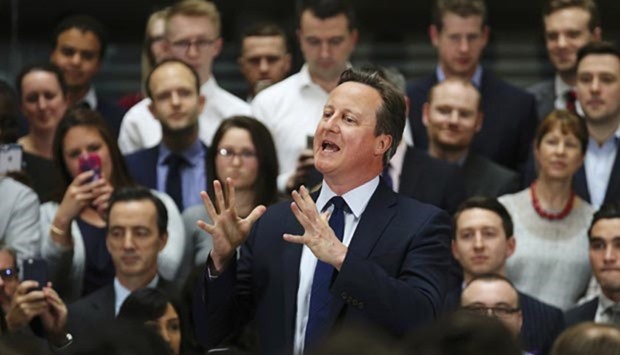British Prime Minister David Cameron said on Tuesday he did not own any shares or have offshore funds, after his late father was included in a leaked list of clients using a law firm in the tax haven of Panama.
Cameron's father has been reported to have run a network of offshore investment funds, and when asked on Monday to confirm that no family money was still invested in the funds, Cameron's spokeswoman said it was a "private matter".
"I own no shares. I have a salary as prime minister, and I have some savings, which I get some interest from, and I have a house," he said at a question and answer session while campaigning to keep Britain in the European Union.
"I have no shares, no offshore trusts, no offshore funds, nothing like that."
The revelations are embarrassing for the prime minister, who has sought to lead international efforts to improve financial transparency and whose government is hosting an anti-corruption summit covering the issue next month.
Opposition Labour leader Jeremy Corbyn called for an investigation into the tax affairs of all those implicated in a massive leak of tax documents from Panamanian law firm Mossack Fonseca, including the Camerons.
"I think the prime minister, in his own interest, ought to tell us exactly what's been going on," he said.
Corbyn also suggested that London could impose direct rule on British overseas territories if they were revealed to have become places for "systematic evasion" of tax.
Pursuing tax evaders
The prime minister's father Ian Cameron helped found Blairmore Holdings Inc, an investment fund based in the Bahamas, in the early 1980s and was reportedly one of five UK-based directors until shortly before his death in 2010.
His offshore dealings were previously known, but the leaked documents revealed that the fund hired local residents to sign its paperwork to avoid paying tax in Britain.
"In 30 years, Blairmore has never paid a penny of tax in the UK on its profits," said The Guardian newspaper, which has seen the leaked documents along with the BBC.
There is no suggestion that the fund acted illegally or that the family did not pay tax on any repatriated assets.
But Corbyn called for an independent investigation, and demanded the government in general "stop pussyfooting around on tax dodging".
"There cannot be one set of tax rules for the wealthy elite and another for the rest of us," he said.
In a statement, Jennie Granger, the government official in charge of revenue enforcement and compliance, said her department would "relentlessly pursue tax evaders".
Legislation forcing British companies to disclose who owns and benefits from their activities comes into force in June.
Direct rule option
The revelations emerged from the leak of 11.5mn confidential documents from Mossack Fonseca, which specialises in creating offshore shell companies.
The leak has shone a spotlight on tax havens, including the British Virgin Islands (BVI), a tiny British overseas territory in the Caribbean.
Despite having a population of only around 30,000, it is among the top five investors in Russia and China, according to a 2014 report by the OECD.
BVI and other British overseas territories signed a deal in 2013 to share information about bank accounts, in a move hailed by Cameron's government as a "turning point" in efforts to tackle tax evasion and illicit finance.
But Corbyn said London should consider imposing direct rule if they did not take tougher action.
"If they've become a place for systemic evasion and short-changing of the public in this country, then something has to be done about it," he told the BBC.

